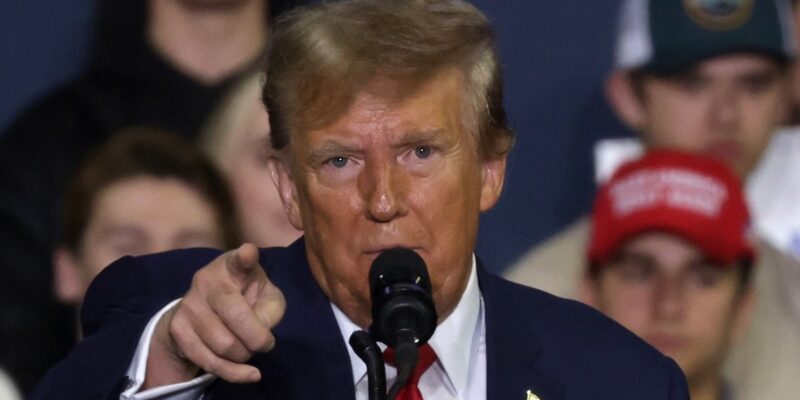
Former President Donald Trump looked out into the red-and-blue-clad crowd at his packed rally in Manchester, New Hampshire Saturday night and pointed toward the back of the arena, where credentialed media were required to sit.
“Biden and his radical thugs have weaponized the DOJ, and his protectors, and the fake news media. Right back there. Look at all of them. Whoa,” Trump said as he gestured to the press. “Fake news. The fake news.”
For Trump, the media-bashing was a familiar refrain. But what was new was the extent to which his competitors in the Republican field have adopted his anti-media rhetoric and tactics. During the 2016 primaries, Trump’s campaign was notorious for barring certain news outlets from attending his events. And I certainly wasn’t shocked when his 2024 campaign rejected my requests for media credentials at his New Hampshire events. (In Manchester, instead of joining my media colleagues in the press section, I waited for two hours in the 16-degree weather in the general admission line, where vendors were hawking $15 t-shirts depicting Trump peeing on a CNN logo.)
Yet I was surprised that it wasn’t just Trump blocking reporters. So too was Nikki Haley’s campaign. Over the course of several weeks, I repeatedly asked her press team to add me to their media email lists to no avail and they rebuffed my credential requests. It wasn’t just me. A reporter from the New York Times told me that they, too, had experienced difficulty getting credentialed by the Haley team. Axios corroborated that reporter’s experience on Friday, reporting that Haley’s team “has limited her interactions with non-local reporters” in recent days. The campaign failed to publicize all of her campaign stops in the state this week, and only “select reporters knew about stops in Littleton and Rochester.”

A screenshot of Mother Jones’ credential request.
Meanwhile, a separate reporter for a popular digital outlet told me that his friends in the foreign press corps had groused about their inability to get credentialed by any GOP candidates. On Monday morning, I witnessed the Haley campaign turn away a Swedish journalist who had registered in advance for an event in Franklin.
The relationship between the “liberal media” and political conservatives has been fraught for decades, with Gallup reporting that just 14 percent of Republicans trusted the mass media in 2022, down from 32 percent in 2015. But Trump’s relentless efforts to discredit the press seems to have ushered in a new and more hostile environment when it comes to Republican candidates and the press.
This dynamic was on display recently when NBC News’ Vaughn Hillyard asked Rep. Elise Stefanik (R-NY), a possible Trump veep pick, “Do you believe E. Jean Carroll?”
“No, of course not,” Stefanik said. “The media is so biased. This is just another example of the media being out of touch.”
“It’s not the media,” Hillyard corrected her. “It’s a jury that found he sexually abused E. Jean Carroll.”
On Sunday, Hillyard was barred from traveling with Trump despite serving as the designated NBC news pool reporter whose role was to share reporting with other media outlets. Puck News reported the ban was a result of Hillyard’s exchange with Stefanik.
The problem with this vindictive approach, says Theodore Glasser, a media accountability expert and professor emeritus at Stanford University, is that Republican candidates boycotting certain reporters is “not a critique of the press,” which he says is healthy in a Democratic society, but “a dismissal of the press. And under those conditions, it’s a lot easier to arbitrarily decide who can attend and who is going to be excluded.”
This increasing media hostility doesn’t only hurt the public, by depriving them of reporting that could inform their election choices and hold candidates accountable for their actions, Glasser says. It can hurt the candidates, too. At the outset of the 2024 election cycle, Florida Governor Ron DeSantis looked like he was building a formidable base of support. His strategy involved largely shunning the mainstream media, and he set the tone for his candidacy when he announced his presidential run in a disastrous Twitter streaming event with Elon Musk that was marred by technical issues.
Earlier this week, before dropping out of the race as he polled in the single digits, DeSantis admitted he regretted ignoring traditional news outlets.
“I came in not really doing as much media,” DeSantis told radio host Hugh Hewitt. “I should have just been blanketing. I should have gone on all the corporate shows. I should have gone on everything.”
While antipathy towards the media didn’t start with Trump in 2016, it certainly was exacerbated by it. About a century ago in political years, that is, in 2008, my colleague David Corn wrote about how Republican John McCain’s presidential campaign seemed to be refusing to take questions from certain reporters on national press calls.
At least Corn was permitted to join the calls in the first place.















